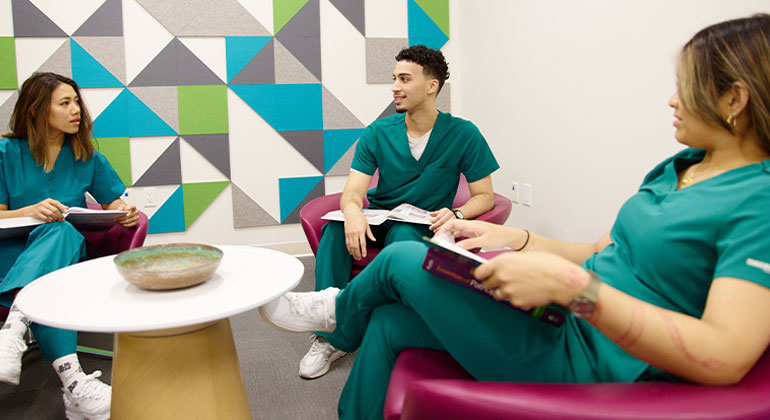
About Us
The mission of the Mount Sinai Phillips School of Nursing is to provide an exceptional nursing education to a diverse student body in an inclusive, equitable environment that will advance the delivery of outstanding healthcare to local and global communities.
Vision
The vision of Mount Sinai Phillips School of Nursing is:
- To actively respond to society’s need for caring, knowledgeable, and skilled nursing professionals.
- To use and develop evidence-based research as the foundation for contemporary education and clinical practice.
- To be a leader in nursing education.
Mount Sinai Phillips School of Nursing Diversity Statement
Supporting our foundational mission to provide an exceptional nursing education to a diverse student body in an inclusive, equitable environment, the Phillips School of Nursing (PSON) is committed to promoting and supporting diversity, inclusion, and social justice throughout our teaching, scholarship, and service pillars among students, faculty, and staff. Our vision is to embrace these principles in our quest for equity and to advance the delivery of outstanding health care to local and global communities.
Our Office of Student Services advises and gives professional guidance to all students, including underrepresented groups at all levels, and serves as a liaison to the academic departments.
Assistance may be provided regarding:
- Academic progressions and concerns
- Students’ socialization into the academic subculture
- Academic support and referral for related services
- Curriculum advisory services
PSON Diversity FAQs
People of color comprise:
- 49.8 percent of undergraduate students
- 60 percent of the faculty
- 70 percent of the staff
Males comprise:
- 11.4 percent of undergraduate students
- 10 percent of the faculty
- 60 percent of the staff
Phillips School of Nursing Commitment to Diversity
Chats for Change
Philosophy
The philosophy of Mount Sinai Phillips School of Nursing reflects the beliefs of the faculty regarding individuals, society, nursing, education and the role of the nurse within the health illness continuum.
The faculty’s belief is embodied in the recognition that human beings possess physical, social, psychological, spiritual and cultural qualities. Inherent in this belief is that human beings are endowed with self-worth and dignity and have a right to have their basic needs met. The human experience is dynamic throughout the life cycle and an individual’s behavior reflects continuous interaction with the total environment.
Society is comprised of individuals, diverse in their cultures, customs and behaviors, whose interactions occur through membership in family and community groups. The School of Nursing, as part of the community, prepares graduates to make vital contributions to society. This is achieved through provision of care to individuals and groups of individuals in varied health care settings and by participation in health-related community activities.
Health is a dynamic state with levels of wellness existing along a continuum. Optimal health is a state of physical, mental and social well-being and not merely the absence of illness. Illness is manifested by compromised functioning and diminished capacity to meet one’s needs.
Nursing is a dynamic, interactive process between the nurse, patient, family and significant others whereby goals are mutually established in order to meet compromised patient needs. Nursing practice is caring and humanistic, aimed at assisting patients to achieve their highest level of functioning.
Adult education is an interdependent process between teacher and learner. The educator functions as a facilitator, resource person and role model who encourages students to develop the knowledge and critical thinking skills necessary to deal with challenges. The learner is a motivated individual who internalizes and applies new principles, concepts and skills as evidenced by modification of attitude, ideas and behavior. Inherent in this process is the development of the learner’s self-awareness, independent decision-making and accountability. Optimal learning occurs in an interactive environment where mutual respect and freedom of inquiry are fostered.
Nursing education provides the graduate with the competencies necessary to implement nursing care based upon current knowledge and concepts of the biological, social and behavioral sciences, nursing concepts, current technology and health care trends. The ultimate goal is to graduate nurses who deliver competent and compassionate health care, both locally and globally, and who participate in professional activities and demonstrate a commitment to lifelong learning.
Graduates are prepared to function in a collaborative role with other health care practitioners when providing and managing preventative, restorative and supportive care to individuals. They practice in a variety of health care settings utilizing established protocols within an ethical and legal framework.
Strategic Plan Overview
| Goals | Objectives | |
|---|---|---|
|
Teaching |
To build capacity in pedagogy, becoming leaders in nursing education and enhancing student’s competency to practice. This involves moving from a lecturer and teacher paradigm to a more student-centered paradigm.
|
|
|
Scholarship |
To advance the scholarship capacity of PSON to become a nationally recognized institution on the leading edge of nursing education.
|
|
|
Service |
To be a leader in the local, national and global communities by educating top quality nursing students and by collaborating with and within these communities to foster the health and well-being of the various populations. |
|